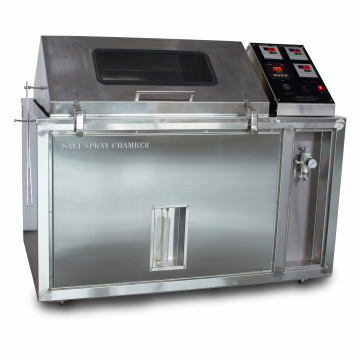Salt Spray Testing: Mechanism, Components, Uses, Benefits
by Kevin Hart Digital Marketing ExecutiveA
salt spray tester, otherwise known as a corrosion test machine or salt fog
chamber, is regularly utilized in automotive, aerospace, electronics and
coatings industries to evaluate a material or coating's resistance to
corrosion. It replicates the effects of corroding metal surfaces with precision
by creating an environment which speeds up the process of oxidation. The test
specimens - could be metal parts, finishes or coatings - are placed inside the
chamber while a saline solution is atomized and sprayed onto them. Materials
and coatings are often tested for corrosion resistance using salt spray testing
in industries like automotive, aerospace, coatings, and electronics. This
article provides an overview of how salt spray testing works, its components,
and the benefits it offers in various industries.

Components of a Salt Spray Tester
A salt spray tester consists of various components, such as a corrosion-resistant test chamber with transparent windows for observation.
It also includes a salt solution reservoir, an atomizing nozzle system, controllers to regulate temperature and humidity, specimens racks or holders made from non-corrosive materials, and a control panel for testing parameters.
Moreover, more advanced models come with monitoring and data recording systems to record variables like temperature, humidity and test duration for data analysis and reporting. Safety features are typically also included to protect the operator from potential accidents due to unusual conditions.
Although minor differences may arise depending on the manufacturer and industry standards, these basic components generally remain consistent among each device.
Working Mechanism of Salt Spray Tester
The working mechanism of salt spray testing involves placing test specimens in a sealed chamber made from materials such as PVC or stainless steel.
The salt solution, typically sodium chloride and water, is held in a reservoir that atomizes the solution into fine droplets, creating a salt fog. An atomizing nozzle system sprays the mist of salt solution into the chamber to generate a uniform atmosphere.
Heaters/coolers and humidity control systems are used to properly regulate
temperature and humidity. After the prescribed duration, the specimens are
removed and inspected to evaluate corrosion.
Uses of Salt Spray Tester
Salt spray testers or corrosion test machines are utilized in various industries where it is essential to evaluate corrosion resistance. These tests are particularly beneficial for the coatings, automotive, and aerospace industries, among others.
In
the coatings industry, they are used to determine the efficacy of
protective coatings in preventing metal surfaces from corroding. They help
manufacturers choose the right coating for applications like marine products
and car parts.
In the automotive industry, salt spray testing is done to test corrosion resistance of components like body panels and fasteners. Through these evaluations, manufacturers can strengthen their designs or materials used and consequently improve corrosion protection and vehicle durability.
The Aerospace and Electronics Industries both rely on salt spray testing to assess corrosion resistance. In the aerospace sector, it is employed to evaluate materials and coatings used in aircraft structures, components, and engines, as they must withstand the harsh environmental conditions of flight. The same is applicable for electronic components; salt spray testing helps verify their survivability in humid or corrosive environments so that reliable materials and coatings can be chosen.
Salt spray tests are used to assess corrosion resistance in various metallic materials, such as alloys, stainless steel, and plated surfaces, in the metal industry.
In research and development, salt spray testing is used to evaluate corrosion behaviour in new materials, coatings, and surface treatments. Researchers can use it to create corrosion-resistant materials and corrosion-resistant technologies.
Benefits of Salt
Spray Tester
Salt spray testing offers numerous advantages in a variety of industries. It can be used to evaluate corrosion resistance and verify material selection and product development, while promoting quality control by ensuring that products meet corrosion resistance criteria.
Furthermore, it supports research and development by allowing study of corrosion behavior and performance. Additionally, due to the ability to identify weaknesses or defects in materials or coatings at an early stage, salt spray testing can help save money on costly failures and recalls down the line.
Lastly, it enables manufacturers to comply with standards and regulations concerning corrosion resistance.
It
is crucial for many industries to evaluate the corrosion resistance of
materials and coatings using salt spray testing. By simulating corrosive
environments, it helps identify weaknesses, improve product durability, and
ensure compliance with industry standards. In order to select materials,
control quality, and conduct research and development processes, industries
need to understand its working mechanism, components, and benefits.
Sponsor Ads
Created on Jul 13th 2023 01:51. Viewed 156 times.



